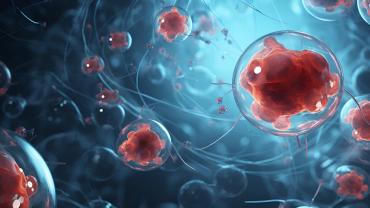
NAD+ (nicotinamide adenine dinucleotide) is a molecule found in every living cell and is essential to many important cellular processes, particularly cellular energy production. It is involved in more than 500 biochemical reactions including DNA repair and the synthesis of cholesterol, steroids, and other critical molecules in the body. Nicotinamide riboside (NR) is a variation of vitamin B3 (niacin) and is a building block for NAD+. Emerging research suggests that supplementation with NR has been shown to improve NAD+ levels in the body and help support mitochondrial function and age-related cellular changes.
A recently published twin study explored the potential supportive role of long-term NR supplementation in mitochondrial health and other parameters related to cellular function. The study involved twenty pairs of monozygotic twins. The treatment group consisted of escalating amounts of NR (250 to 1,000 mg daily) for five months. Upon supplementation with NR, increased blood NAD+ levels were observed alongside improvements in myoblast differentiation and abundance of mitochondria in skeletal muscle. In addition, epigenetic parameters related to DNA methylation in certain tissues were reported to change in the presence of NR supplementation. Certain improvements in gut microbial composition were also observed; increased amounts of Faecalibacterium prausnitzii, a strain associated with metabolic health and a healthy inflammatory response, were reported.
Results from clinical trials suggest that the administration of NAD+ precursors including NR may support cellular energy production and age-related health. A randomized placebo-controlled crossover trial (n=22) explored the potential link between NR supplementation and parameters related to neurodegeneration in healthy adults over 65 years of age. The treatment group received 500 mg NR twice daily for six weeks. Increases in neuronal NAD+ concentrations were reported in the treatment group. While whole-group analysis did not find differences in neuronal markers between the treatment group and placebo, a subgroup analysis found significant decreases in amyloid-β 42. This suggests that more research investigating the potential relationship between NR and neuronal health may be warranted.
Neuroinflammation has been linked to reductions in NAD+ levels during the natural aging process. An animal study explored the impact of NR administration on parameters related to neuroinflammation. Increases in NAD+ levels were observed alongside decreases in the number of senescent cells and proinflammatory cytokines interleukin (IL)-6, IL-1β, and tumor necrosis factor-α. More research is needed, particularly in the clinical setting and with more study participants.
NAD+ and its precursors such as NR are critical to hundreds of biochemical reactions in the human body. Evidence suggests that supplementation with NR may help support cellular health, energy production, and age-related changes.
By Dr. C. Ambrose, ND, MAT